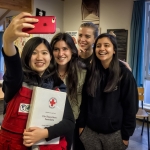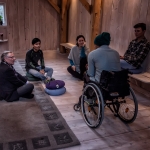Neil Davis Friluftsliv PBL
The intention of the inaugural Neil Davis Memorial PBL was to get students away from ski lifts, giving opportunity and attention to appreciating outdoor experiences in a wintery wilderness context. So it seemed somehow fitting that in the weeks preceding the ‘Project-based learning’ week, we had experienced a large snowfall, then a week of strangely warm weather with winds that removed most of the snow, then, in the days immediately before the start of the week, a hurricane hit the west coast somewhat to the north of us – bringing huge snowfall and widespread power outages.
The trip description had advertised strenuous snow shovelling, food of dubious quality and the importance of a certain disregard for comfort. Unfortunately, a Costa Rican had to miss the trip, leaving us with two Danes, two Dutch and a random South African. Given reservations that there might not be enough snow, we erected a lavvu for the first night, then spent a few hours adding snow to the potential roof of the potential cave. The next day, sweaty shovelling indeed created a homely cave; a welcome shelter from the incessant falling powder and breeze outside. Nearly half a metre of powder on the slopes made for comfortable face-plants – an approach to skiing apparently shared by both Danish and Dutch nationals. We had magnificent friluftsliv experiences, including simple meals richly appreciated by all participants in the frozen desert-like Gaularfjell!
- Skiing in
- Snow!
- At the lavvu
We are very grateful to the Davis family, Mike and Lee, for providing the funding to make this annual event possible.













